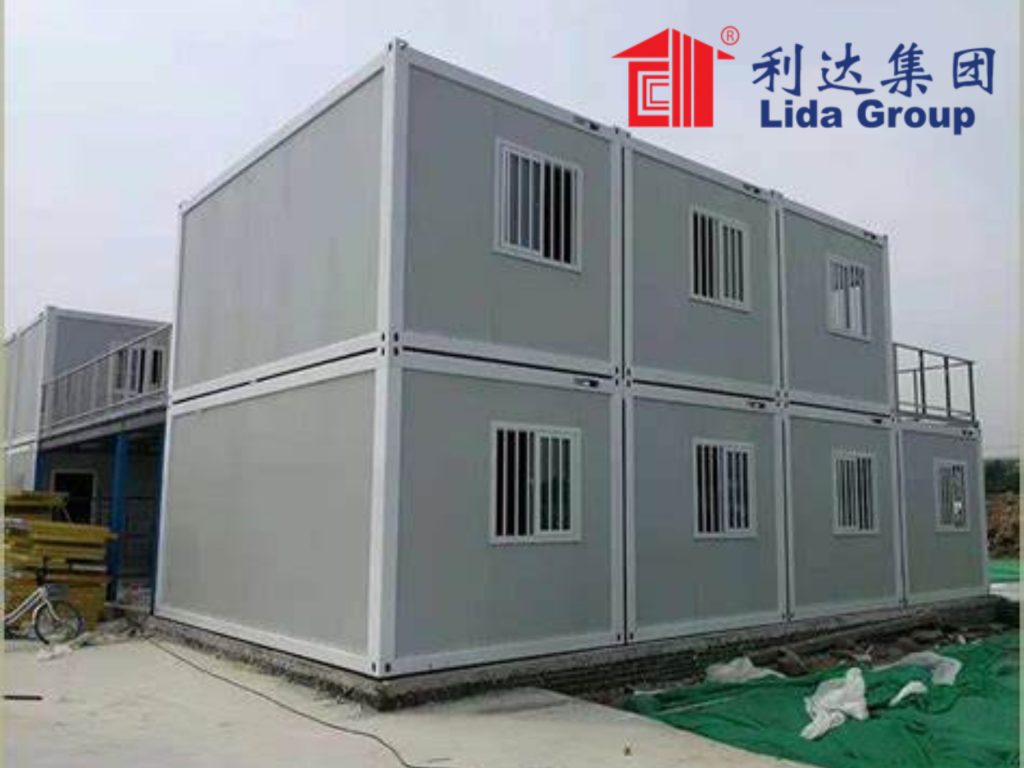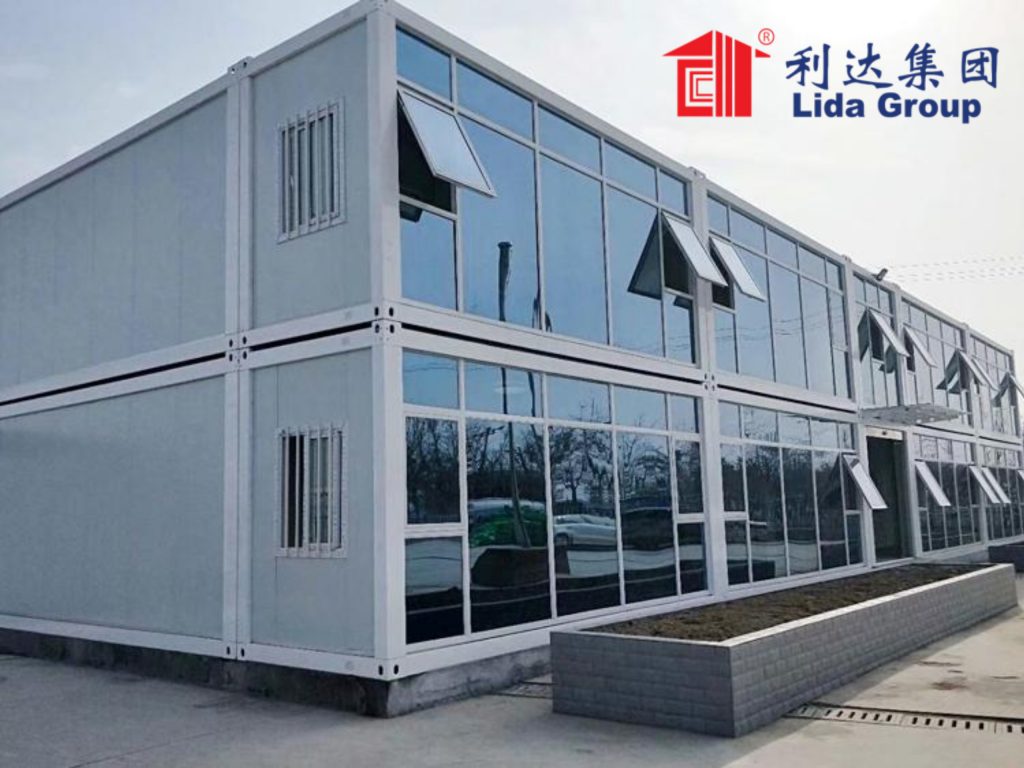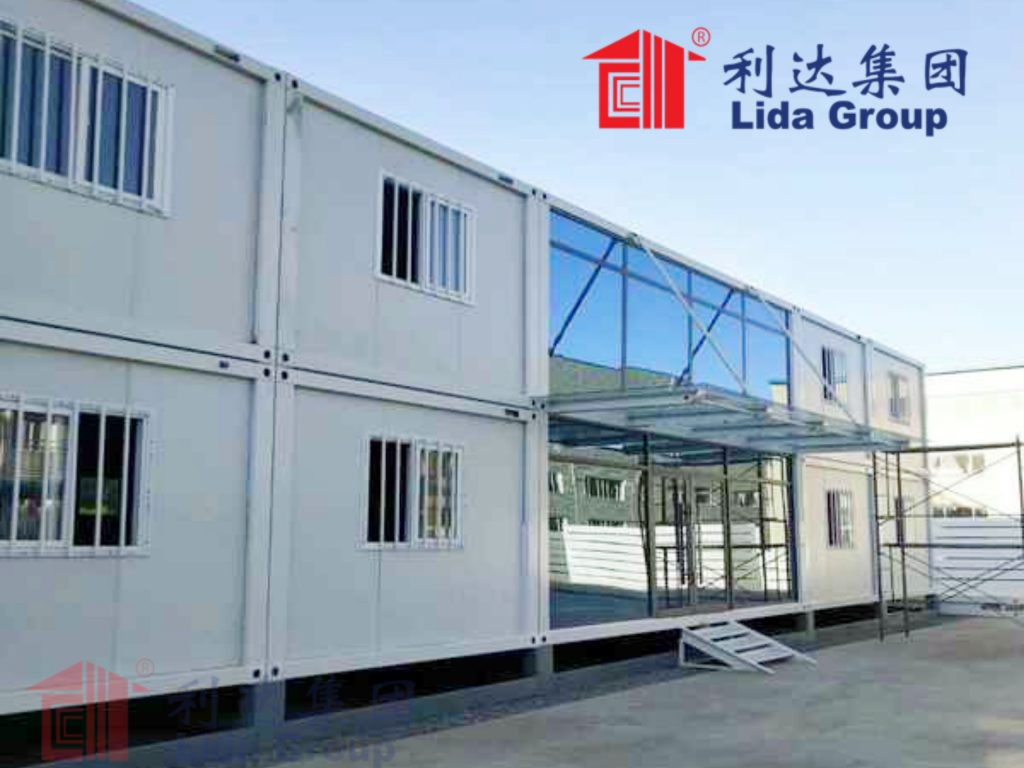A new study conducted by researchers at several leading universities has found that prefabricated house modules designed and manufactured by China-based construction firm Lida Group can drastically reduce the time needed to build entire residential subdivisions compared to conventional on-site construction methods.
Lida Group is a pioneer in developing prefabricated modular construction solutions using recycled shipping containers as the building blocks. Their container house modules are fully finished interior living spaces that serve as rooms, wings, or entire dwellings that can be transported and stacked on site like Lego blocks to rapidly form entire neighborhoods from the ground up.
Researchers from Tsinghua University, Taiwan Tech, and the University of Southern California conducted case studies of four housing developments built using Lida Group’s modular container house technology and compared them to traditionally built subdivisions of similar sizes and compositions. The goal was to analyze construction timelines, costs, environmental impact, and long-term maintenance factors between the two different approaches.

For their analysis, the research team looked at two 100-unit subdivisions built using Lida Group modules completed in 2021 and compared them to two nearby traditionally built 100-unit neighborhoods from 2020. Each of the modular projects used combinations of single-story studio apartments, one-bedroom units, and small duplex structures constructed off-site in a factory setting before being transported for rapid assembly.
One of the most striking findings was the difference in overall construction periods. The two subdivisions built with Lida Group’s modules were completed in just 6 months total from start to finish of the entire projects, including land development, infrastructure installation, and housing construction.
By comparison, the traditionally built neighborhoods took an average of 24 months from initial planning phases to the final certificates of occupancy being issued for all homes. This represents a 75% reduction in total construction time using the modular system.

Breaking it down further, the researchers found the modular projects required only 8 weeks for on-site assembly and installation of all container house modules once delivered. Land clearing, foundation and utility work comprised another 6-8 weeks. Comparatively, conventional projects averaged 12 months for solely on-site building activities before interior work could begin.
On the cost front, the upfront capital needs were found to be marginally higher for the modular developments due to factory production inputs. However, the research concluded this premium was more than offset by dramatically reduced construction periods and associated financing, labor, and project management expenses over the long run.
Analyzing recurring maintenance and repair expenditures over the first 5 years of occupancy also revealed lower requirements for the modular homes. Their factory-controlled building process led to more consistent quality and less weather-dependent defects compared to on-site building vulnerabilities. Overall lifecycle costs were projected to be lower using the modular approach.

From an environmental impact viewpoint, the use of recycled shipping containers vastly reduced construction waste sent to landfills. Calculations showed container-based projects generated 80% less debris. The prefabrication process also enabled superior levels of insulation, air-sealing, and HVAC design for improved energy efficiency once in operation.
One researcher involved summarized the findings, saying “The modular housing system developed by Lida Group demonstrates the potential of off-site prefabrication to truly revolutionize how entire communities can be built. Traditional on-site construction will always struggle to match such speed, efficiency, and sustainability. For developers and governments seeking to rapidly solve problems of affordable housing supply, modular technologies should be the future.”
Encouraged by the research outcomes, two major state housing authorities in southern China have now contracted with Lida Group to use their modular solutions for building out 10,000 units over the next three years aimed at alleviating housing shortages in fast-growing regions. Plans are also in the works for the company to establish North American production plants to address demand in major western markets.
Overall, the research provides some of the strongest real-world evidence to date of the transformative capabilities of modular and prefabricated construction approaches when applied at the scale of whole subdivision developments. Using recycled shipping containers as building blocks takes the concept even further by drastically reducing material waste. For communities and governments struggling with housing affordability and availability challenges, modular technologies like Lida Group’s container house system clearly offer a path toward rapid and sustainable solutions. As adoption grows, conventional on-site building approaches may no longer be able to compete on timelines or resource efficiency. Prefabrication looks poised to command an increasingly large share of future residential construction projects worldwide.
In summary, this new research study compared housing developments built using Lida Group’s prefabricated modular container house technology against traditionally constructed subdivisions. Findings revealed the modular projects were completed up to 75% faster while generating significantly less waste and having potential for lower long-term maintenance costs. For developers and policymakers seeking to rapidly deliver affordable housing at scale, modular and prefabricated approaches like Lida Group’s container house system provide a highly promising path forward. As adoption increases, modular construction techniques could ultimately transform how entire communities are built.

Related news
-
Lida Group Breaks Ground on Innovative Prefabricated Manufactured Home Development Leveraging Sustainable Features of Structurally Versatile Container Housing Modules
2023-12-04 17:55:18
-
Prefabricated Home Specialist Lida Group Opens New Manufacturing Facility to Mass Produce Durable Container House Modules for Affordable Housing Communities Worldwide
2023-12-04 17:21:21
-
Researchers Collaborate with Building Giant Lida Group to Develop Sustainable and Affordable Prefabricated Container Home Ideal for Rapid Housing Developments
2023-12-04 16:26:25
contact us
- Tel: +86-532-88966982
- Whatsapp: +86-13793209022
- E-mail: sales@lidajituan.com


